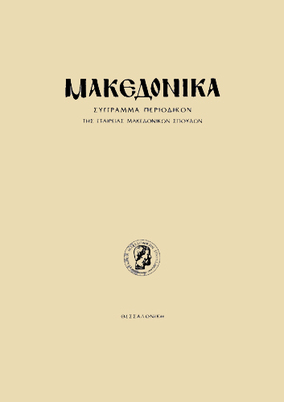Νομικοί και κοινωνικοί όροι της Θάσου από την εποχή της τουρκοκρατίας
Part of : Μακεδονικά ; Vol.30, 1996, pages 229-262
Issue:
Pages:
229-262
Parallel Title:
Legal and Social Terms from Thasos in the Period of Ottoman Rule.
Section Title:
Articles
Abstract:
This article presents a total of seventy-two, mainly dialectal, words selected from an unpublished work on folklore and linguistic subjects written by a Thasian teacher named Aryirios. The words represent legal and social terms from the period of Ottoman rule and many of them are no longer used, precisely because the circumstances that produced them no longer exist. The writer distinguishes two types of words: those that express purely legal concepts in Thasian common law during the period of Ottoman rule, such as αγουριάτ’κα* βιγλαριάτ’κα, bixTOtrt’xa, κουρτσίσα, λαδίσα etc.; and those that express social concepts and social situations, such as rtagivó, σκαρφί, στοιχήματα, σ^ρουφχάζου etc., and, like the previous group, are almost completely regular in form and function. Apart from explaining the meanings of the terms, the writer also gives their etymology, where necessary. Many of them are also found elsewhere in Greece, though in many cases the same words present phonetic and semantic differences in different places and at different times, according to their origin and development, the local people’s circumstances, and how long and how closely they were involved with foreign conquerors. In these cases, the jurisprudent and the linguist have a vital contribution to make, the former to define the conceptual context and precise legal meaning of a term, and the latter to describe its grammatical form, etymology, and semantic evolution. In the absence of a special lexicon of legal terms, and since the documents relating to legal transactions have not yet been published in their entirety and anyway present large gaps in space and time, anything remotely relevant to the subject may assist research. The words have been drawn from three main sources: i) Aryirios’s own collection of idiomatic linguistic material; ii) his own narratives and accounts of customs, in which the words are liberally scattered; and iii) the texts of the legal documents he includes at the end of his collection. Ten of the words are of Turkish origin (αγριλίκ’, αζάς, baxipa, baï;ia’, biXTopç, deoxspéç, κλου- bàv’, μουχταρου (örporryipoudia), σαλμάς, τακίμ’ and τσoυρbατζής), one Persian (agapeia), two Latin (βιγλάρ’ς, with the derivatives βιγλαριάτ’κα and βιγλαργό, and xaLadóp’), and one Italian (τσούρμον). All the rest are Greek.
Subject:
Subject (LC):
Notes:
856:https://ejournals.epublishing.ekt.gr/index.php/makedonika/article/view/5807, DOI: https://doi.org/10.12681/makedonika.246
Electronic Resources:




